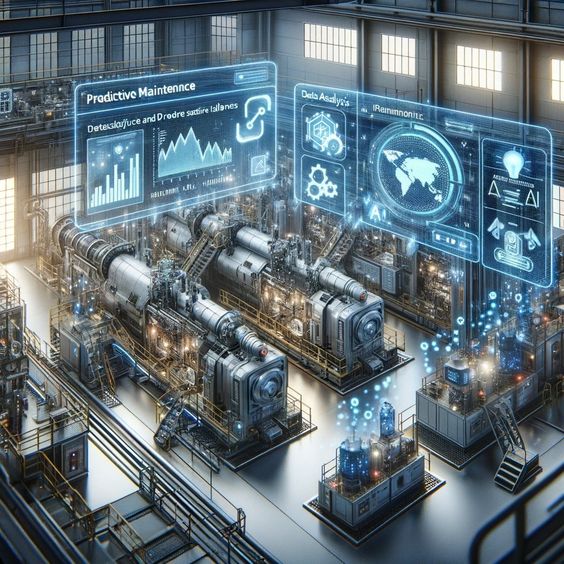
Manufacturing
Manufacturing: Unveiling the Benefits of AI Integration
In the fast-paced world of manufacturing, the adoption of Artificial Intelligence (AI) technologies is revolutionizing production processes, driving efficiency, and unlocking new opportunities for innovation and growth. From predictive maintenance to quality control and supply chain optimization, AI is reshaping various aspects of manufacturing operations, offering profound benefits to manufacturers, employees, and consumers alike. As the manufacturing industry embraces AI-driven solutions, it is poised to achieve greater competitiveness, sustainability, and resilience in an increasingly digital and interconnected global economy.
One of the most significant contributions of AI to manufacturing lies in predictive maintenance. Traditional maintenance practices often rely on fixed schedules or reactive approaches, leading to costly downtime, unexpected equipment failures, and production delays. However, AI-powered predictive maintenance systems leverage machine learning algorithms to analyze sensor data, equipment performance metrics, and historical maintenance records to predict when equipment is likely to fail and proactively schedule maintenance before problems occur. By identifying potential issues in real-time and implementing preventive measures, AI technologies help manufacturers minimize downtime, reduce maintenance costs, and optimize equipment performance, ultimately improving productivity and profitability.
Moreover, AI-driven quality control systems are transforming the way manufacturers monitor and ensure product quality on the production line. Quality defects and inconsistencies can result in waste, rework, and customer dissatisfaction, impacting the bottom line and brand reputation. AI algorithms can analyze images, sensor data, and production metrics to detect defects, deviations, and anomalies in real-time, enabling manufacturers to identify and address quality issues early in the production process. By automating quality control tasks and providing actionable insights, AI technologies help manufacturers maintain high product quality standards, reduce waste, and enhance customer satisfaction, ultimately driving competitive advantage in the market.
Additionally, AI is revolutionizing supply chain management and logistics in the manufacturing sector. Supply chain optimization is critical for manufacturers to ensure timely delivery of raw materials, components, and finished products while minimizing costs and maximizing efficiency. AI-powered predictive analytics models can analyze vast amounts of supply chain data, including demand forecasts, inventory levels, and transportation routes, to identify potential bottlenecks, optimize inventory levels, and streamline logistics operations. By providing real-time visibility into supply chain performance and enabling data-driven decision-making, AI technologies help manufacturers improve supply chain agility, reduce lead times, and respond more effectively to market demand fluctuations, ultimately enhancing customer satisfaction and loyalty.
Furthermore, AI-driven robotics and automation technologies are revolutionizing production processes and enhancing manufacturing efficiency. Industrial robots equipped with AI algorithms can perform repetitive tasks with precision and speed, freeing up human workers to focus on more complex and creative activities. Collaborative robots, or cobots, can work alongside human workers safely and efficiently, augmenting their capabilities and improving overall productivity. By integrating AI-powered robotics and automation solutions into manufacturing operations, manufacturers can increase production output, reduce labor costs, and achieve higher levels of consistency and quality in their products, ultimately gaining a competitive edge in the market.
Moreover, AI technologies hold immense potential in enabling mass customization and personalized manufacturing. Traditionally, manufacturing processes have been optimized for mass production, resulting in standardized products that may not fully meet individual customer preferences and needs. However, AI algorithms can analyze customer data, preferences, and behavior to identify trends and patterns, enabling manufacturers to tailor products to individual customer requirements on a large scale. By leveraging AI-driven customization and personalization solutions, manufacturers can offer unique and personalized products to their customers, enhance brand loyalty, and differentiate themselves in the market, ultimately driving growth and profitability.
In conclusion, the integration of AI into manufacturing operations is revolutionizing the industry, offering profound benefits in predictive maintenance, quality control, supply chain optimization, robotics, automation, and personalized manufacturing. By harnessing the power of AI technologies, manufacturers can improve efficiency, reduce costs, enhance product quality, and drive innovation, ultimately gaining a competitive edge in the global marketplace. As AI continues to evolve and innovate, its positive impact on manufacturing is poised to transform the industry and pave the way for a more sustainable, efficient, and interconnected future.
How will AI Care will help better your field

